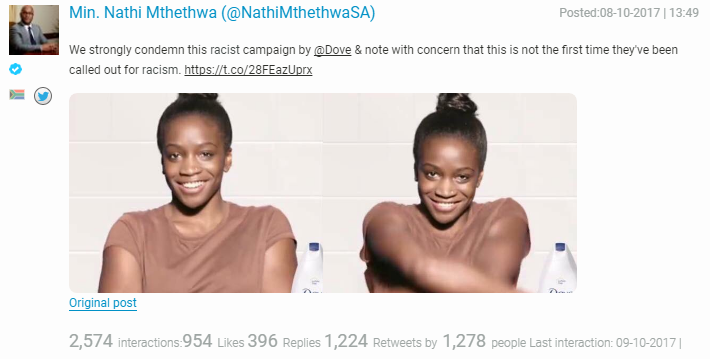Viral post...or not? The Dove ad.
Petar Soldo
The digital age, characterized by the ability to transfer information freely and quickly, seems to have resulted in a culture of lazy online journalism where online news sources and blogs vie for attention by creating eye catching (and usually irrelevant) click bate type headings and lobbing the word “viral” around for greater impact. It is often impossible to see everything that comes into one’s news feed, let alone confirm it. Additionally, the truth behind catchy words like “viral” seems to be of little concern.
A prime example of this is the recently perceived Dove racist ad campaign. The multimillion rand global soap brand released an advert showing a sequence of three images starting with a black woman who then removes her T-shirt to reveal a white woman and later an Asian woman underneath. News sources around the world have reported on screenshots of the ad – first shared by make-up artist Naomi Leann Blake – going viral.
But what does “going viral” actually mean? Urban Dictionary defines something that “goes viral” as an image, hashtag, video, or link that spreads rapidly through a population by being frequently shared with a number of individuals.
An example of this would be the 2015 Fees must fall movement where in Mid October, spanning a week– #feesmustfall got over half a million unique engagements within South Africa.
Does the ubiquitous Dove ad and its related posts live up to the title of “viral”?
At Digital Republic Consulting we are passionate about data and what we can learn from it so with this in mind we attempted to answer this question by looking at the data behind the post.
Posts started appearing on South African social media early on 8th October. These first few posts had very few interactions (between 0 and 30 each). It was not until 11:18 when radio personality, Eusebius McKaiser, tweeted about the topic that things started getting heated. He wrote: "Dove: with one quarter moisturising cream... can't clean racism." (image as posted).
Local actress Bonnie Mbuli weighed in on the topic an hour later with a tweet about the ad.
Over the two day period the most engaged content on Twitter was a Tweet by Minister Nathi Mthethwa which generated 2 574 interactions by 1 278 unique people.
The next 8 most engaged posts on social media were all by news media such as eNCA, Times Live, Eyewitness News and SABC. These posts went a long way to promote this topic. It can be argued that without the news media promoting this story it never would have reached the “viral” status is has so far achieved.
Now let’s look at the numbers across South Africa….
Using our social media listening tool, TRACX, we entered a basic search query to identify mentions, conversations and interactions with the topic around Dove’s racist ad.
Looking at the above numbers one could believe that this topic has actually achieved viral status, however, in 2016 the estimated number of Twitter users was 7.7 million and Facebook had 14 million users. When looking at the topic in relation to the usage numbers we can see that about 0.046% of Facebook and Twitter users in South Africa interacted with this topic. It must be mentioned that due to restrictions placed on 3rd party software tools by the social media platforms themselves, the number of users identified does not include users who’s profiles are set to private, it also only looks at data from South Africa.
So from the 21.7 million Facebook and Twitter users in South Africa, we were able to identify 9 938 unique people interacting with the topic of Dove’s ‘racist’ ad. To give this even more perspective we looked at the hashtag #dstvdelicious within the exact same setting as the Dove topic. Here we saw that 6 879 unique people interacted with only that specific hashtag over two days (6 & 7 October).
Looking at the data again on day three, we can see a drastic drop in the activity around the topic. It peaked on the 9th of October with 9 999 posts and interactions but looking at the same data on 10th October, we see only 936 posts and interactions.
Therefore, can we really say that the Dove racist ad topic has gone viral or is it simply a case of journalists being trigger happy on a word that increases excitement and viewership.





